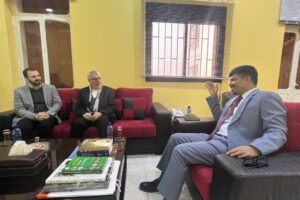The Conceptions of USAL Students Towards the Remote, Online Learning and Its Impact on their Studies in Comparison with the Face-to-face Learning
- Posted by USAL
- Date July 6, 2021

+Researchers:
Dr. Waleed Hammoud, Dean of Faculty of Education at the Lebanese University for Sciences and Arts (USAL) w.hamoud@usal.edu.lb
Dr. Mariam Hmaydan, Head of Department of Principles of Education at the Lebanese University for Sciences and Arts (USAL) m.hmaydan@usal.edu.lb
Mr. Mohammad Hawila, Lecturer at the Lebanese University for Sciences and Arts (USAL) m.hawila@usal.edu.lb
*Faculty of Educations, Lebanese University for Sciences and Arts (USAL), Ghobeiri, Beirut – Lebanon
The study aimed at getting to know the extent of effectiveness of the experience of “remote, online learning” and its challenges from the viewpoint of USAL students, on the level of running the process of teaching and learning, and knowing the extent of its influence on their accumulative average in comparison with the face-to-face learning. Data were gathered by using the descriptive analytical method. It was based on a questionnaire that was applied on a proportional cluster probability sample of 234 USAL students.
The results of the study showed a lack of statistically significant differences between the arithmetic average of the students’ accumulative GPA due to the method of learning in the following variables: major, level of satisfaction with the contents of the learning materials and the technological skills for students before and after the learning.
Results also showed that the level of students’ satisfaction was high during the period of remote learning, regarding the extent of taking advantage of the courses’ contents and succeeding in remote exams, boosting intellectual and communication skills, and acquiring new technological skills. On the contrary, the study exposed several obstacles, atop of which is the low-speed Internet, feeling bored when relistening to the lecture, and the difficulty in applying some skills in the applicable courses.
Researchers have reached that among the most important factors of quality remote learning is: preparing the infrastructure, making material, humanitarian, administrative, and technical expertise available, and having quality multimedia technology. They also recommended the importance of training both instructors and students on how to use advanced programs, and how to adapt with urgent technological developments in order to enhance their teaching/learning practices.
Previous post




